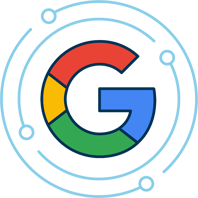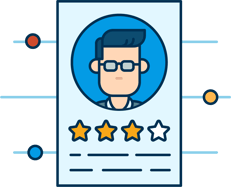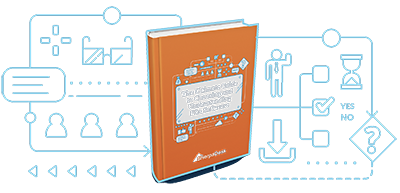Search Engine Optimization can be intimidating for IT entrepreneurs. From SEO and SERP to PPC, just looking into the logistics of tailoring your content for search engines can make you cross-eyed. If you’re busy running an MSP, the last thing you want to do is invest hours of your time into something that may or may not even work. That’s why we put together this comprehensive guide on SEO for MSPs. In it, we walk through everything from SEO basics to more complex concepts to help you get your SEO A-game on. Let’s get started!
First Things First: What Exactly Is SEO?
It's hard to deny the ubiquity of search engines, notably Google. In reality, Google owns the SEO casino today, and we're all just playing in it. Any time the average person has a question, they will run to Google, and let's be honest, once you google it, you're not going to scroll any further than you have to. Studies show that 67% of people don't go further than the first five listings. SEO is optimizing a website to rank higher in search engine results so you can be a part of those first five listings. The goal is to generate more website visitors and, ultimately, more leads and customers for your business.
How To Optimize Your Website for SEO
Now that you understand how important SEO is for your MSP business, it’s time to take a look at a few ways to improve it.
ON-PAGE SEO
Optimizing your website for better search engine rankings is called on-page SEO. This can be anything from ensuring your website is mobile-friendly to using the right keywords in your titles and throughout your content. On-page SEO has a public-facing side (the content your customers can read) plus a non-public side, which is also known as technical SEO, which is written inside your website's HTML so that Google's spiders (or any other browser crawlers) can quickly figure out what your website and particular landing page is about so that it can get indexed.
1. Title Tags and Meta Descriptions
The title tag is an HTML code tag that Google's spiders (or any other browser's) read as your web page's headline. This is followed by the meta description, an HTML element that summarizes your web page's content. On the public-facing side of the web page, the title tag will be the page's headline or title that will convince people to click on it. The meta description will also appear in search results under your web page's headline to help your readers know what the page is about. So these two elements are both public-facing and part of the HTML code. A well-written title tag must be engaging, offering a chance to shine and beat your competitors for that precious customer click.
2. Keywords
As we mentioned before, keywords are the words or phrases that describe your business or website. Think of keywords as the search terms your customers use to find your business. Making sure you are using the proper keywords to get the attention of your ideal consumers can be a challenge, but it's vital if you hope to make it to that first page of Google's search results. Brainstorm keywords with your team that are most relevant to your MSP's services, like "Where to find IT support?" or "Best Digital Security Service." Once you have gathered the crucial keywords for your services, you can then use Google's Keyword Planner to see which other related keywords will attract the most traffic. Once you find the most relevant keywords for your customers, you should focus your content on them. Another important place to acquire relevant keywords is to track your main competitor's keywords and cherrypick the most pertinent to your business. You can use tools like Spyfu for that.
3. On-Site Navigation
Your customers should find the information they expect when clicking on your links. A confusing or poorly organized web page will waste all your work to get potential customers there.
You also want to organize your content in a way that will lead customers deeper into your website. Use internal links from your blogs to relevant pages on your site to drive relevant traffic to the solutions your customers are looking for.
OFF-PAGE SEO
Off-page SEO is all about promoting your website and content on other people’s websites. The goal is to get people talking about your services, linking to your website, and sharing your content—all of which help improve your search engine ranking.
 A great way to start building your off-page SEO is with link building. This is when you get other websites to link back to yours. The more high-quality websites that link to you, the better. You can create great content, reach out to other website owners to let them know about it, and do guest blogs on other high-ranking websites, especially your partner websites offering supplementary services that your customers will benefit from.
A great way to start building your off-page SEO is with link building. This is when you get other websites to link back to yours. The more high-quality websites that link to you, the better. You can create great content, reach out to other website owners to let them know about it, and do guest blogs on other high-ranking websites, especially your partner websites offering supplementary services that your customers will benefit from.
Voice Search and Long-tail Keywords
Speaking of long-tail keywords, let's look at why they're some of the most critical factors in SEO. Long-tail keywords are longer and more specific keyword phrases that visitors are more likely to use when they're closer to the point of purchase. Long tail keywords are also more likely to be used on voice searches. With the rise of digital assistants like Siri, Cortana, and Alexa, or during simple Google map searches while driving, voice search is becoming increasingly popular. People use voice search to find services instead of using traditional keywords.
Long-tail keywords are simply phrases that are specific to what you do. For example, if you are an MSP specializing in cyber security, a long-tail keyword could be "How do I prevent my business from getting hacked?"
Google My Business Listings
One of the most important ranking factors for MSPs is having an up-to-date and accurate Google My Business (GMB) listing. They will appear in the Maps section of search results and can give your business a boost in visibility, especially if you appear in the top 3 listings.
To ensure that your GMB listing is as effective as possible, make sure to:
• Use keyword-rich descriptions
• Include images and videos
• Use a local phone number
• Encourage customers to leave reviews
Pay Per Click Ads
A common misconception is that you have to choose between SEO and pay-per-click (PPC) ads—you can’t have both, right? Wrong! The fact is the two complement each other quite nicely.
PPC ads quickly boost your visibility in search engine results pages (SERPs) while also helping you test different keywords and see which ones perform best for your business. Then, once you better understand which keywords are most effective, you can focus your SEO efforts on those terms to further improve your ranking.
E-A-T
Expertise, Authoritativeness, and Trustworthiness are three factors that greatly influence your SERP on Google. No one outside of Google knows exactly how they rank this, but a few things have proven helpful in increasing your E-A-T ranking.
1. Have Links on Other Sites
This goes back to off-page SEO. If people are linking back to your content, Google will see that it carries some weight.
2. Get Positive Reviews
Good reviews will not only increase the likelihood of attracting new customers, but they will also signal to Google’s algorithm that they should push your content. Encourage customers to leave positive reviews whenever you can.
3. Write with Authority
Trustworthiness can affect your rankings and be challenging to quantify, but one way to show it to Google's algorithm is to include sources in your articles and do your best to keep references to studies accurate.
Conclusion
The importance of SEO for your business can not be overstated – and since MSPs are operating within a digital landscape, having a handle on where your online traffic comes from will give you a considerable boost.
Managing SEO can be time-consuming but crucial to your MSP's success. Therefore SEO must be at the core of all your marketing and content efforts to help your MSP succeed.



.png)




comments